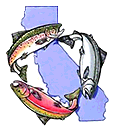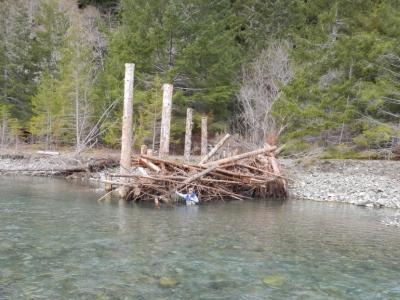Biological Responses: Fish Seeks River With Ample Flow and Bugs, Not Too Hot
Session Coordinator:
Eli Asarian, Riverbend Sciences
Streamflow and water temperature strongly influence organisms in rivers and streams. Flow regulates disturbance, water velocity, rates of downstream transport, and is an important driver of water temperature. Water temperature controls rates of chemical and biological reactions that have cascading effects throughout the ecosystem, including influences on behavior, species composition, and inter-species interactions. Flow and temperature affect every level of the aquatic food web including primary producers (e.g., algae and aquatic plants), primary consumers (e.g., macroinvertebrate grazers), and predators (e.g., other macroinvertebrates and vertebrates including fish). Every fish species has its own range of thermal tolerance, but these tolerances can also affected by other local variables such as prey availability and water velocity. Greater access to food can enable coldwater fish to tolerate warmer water, up to a point. Coldwater fish living in environments near the upper edge of their temperature tolerances often seek refuge in areas such as tributary confluences which offer cool water but are close enough to productive mainstem habitats to allow foraging when conditions are suitable. This session will feature a diverse collection of presentations on how flow and temperature influence river food webs as well as fish distribution, behavior, and bioenergetics. Presentations focus on rivers and streams in the Klamath Basin and Eel River Basin.
An Observational, Comparative, Field-based Study of Thermal Tolerance in Juvenile Salmonids as a Function of Food Availability: Implications for Recovery and Restoration
Joshua Strange, Sweet River Sciences
Decreased Streamflow in a Mountain Stream Ecosystem Reduces Fish Energetic Efficiency and Alters Fish Behavior Through Reduction of Size and Abundance of Invertebrate Drift
Timothy Caldwell, University of Nevada, Reno
Primary and Secondary Production in Dammed and Undammed Reaches of the Eel River
Lara Jansen, Environmental Science & Management, Humboldt State University
Interannual Variability in the Timing of Sacramento Pikeminnow Migration in the South Fork Eel River
Philip Georgakakos, University of California Berkeley
Thermal Refuge for Salmonids at Tributary Confluences in a Warming River Network
Terrance Wang, University of California Berkeley, Department of Environmental Science, Policy, and Management
Panel Discussion
All presenters

